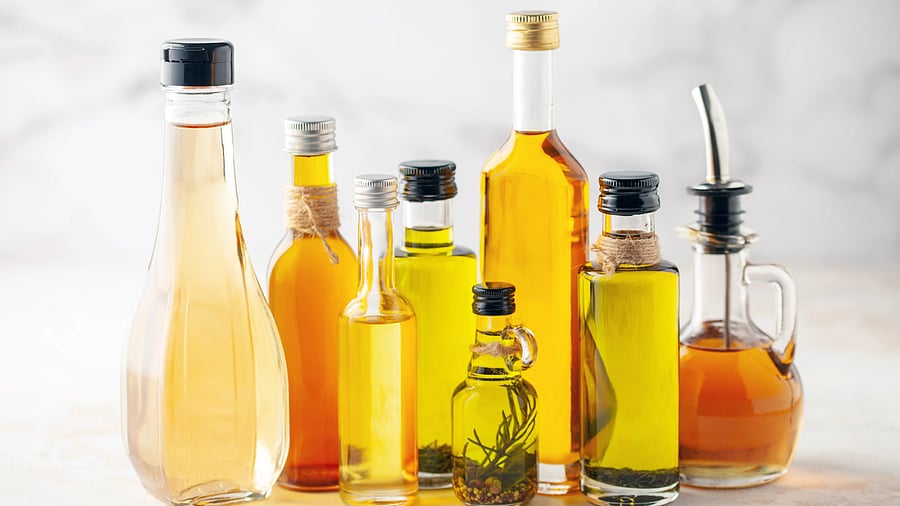
Years ago, while travelling around the Midwest in the US, we checked into a Bed and Breakfast (B&B), a room with a sparingly stocked little blue kitchen, paisley printed tableware and linen, where I was only happy to plug in my rice cooker and stir up a pulao. My supplies lasted a couple of days and then we were at the mercy of the quaint store in town, which sold everything from wipes and toilet rolls to fruit pops and soda. I picked up whatever came close to familiar — onions, garlic, canned beans, salad vegetables, apples, and for oil, the only one they had on the shelves: grapeseed oil, which, as I recollect, made a stellar salad dressing.
Today, I cook exclusively with coconut oil, with the occasional few cups of groundnut oil for deep-frying. For salads, I use olive oil, and for dosaes and idlis with chutney pudi, the quintessential sesame oil. Of course, being a bi-cultural family, we also stock mustard oil, which goes into the postos and jhaal muris.
There’s a lot of noise on the best oil to use in everyday cooking lately, and in our quest for sustainable choices that honour local traditions and modern health wisdom, choosing the right oil plays a key role.
Cold-pressed oils: nutrient-rich & sustainable
Cold-pressed oil extraction uses mechanical pressing without heat or solvents, and is said to be effective in preserving antioxidants, vitamin E, beta carotene, and natural flavour, unlike refined oils. There’s been a sudden surge of local oil presseries everywhere, which not only offer a variety of local nut and seed oils, but also repurpose the leftover grain cakes, rich in protein and fibre, in many ways: as animal feed, compost, health bars and snacks, or even fuel, embracing sustainability by minimising waste.
Virgin oils: everyday use
Virgin oils are typically extracted from seeds, nuts, or fruits without chemical refining or high heat, which helps preserve their natural antioxidants, vitamins, and flavour. Compared to refined oils, both virgin and cold-pressed oils are generally considered healthier because they retain beneficial compounds like polyphenols and Vitamin E. It’s also important to note that they are less stable at very high temperatures, so they are best used for sautéing, stir-frying, in salads, and to add finishing touches to dishes rather than deep-frying.
There’s a whole load of information on how to consume virgin coconut oil (especially one that’s a result of wet processing of coconut flesh or milk). Virgin coconut oil is known for its medium-chain triglycerides (MCTs), which may aid metabolism, support gut and brain health, and offer antioxidant and antimicrobial properties.
Clinical studies show that consuming around 30 ml everyday can raise HDL (good) cholesterol. However, it is also high in saturated fat and may elevate LDL (bad) cholesterol, and studies suggest it’s not ideal for heart health if used excessively. And this is where grandma’s wisdom comes in — use it in moderation.
Ideal oil for deep frying
The smoke point of an oil is a key factor in deciding its stability and use. If the oil starts breaking down and gives off smoke easily, it releases unhealthy compounds. Generally, an oil with a high smoke point (ideally 190°C) is best for deep-frying.
• Refined coconut oil has a smoke point above 200°C, whereas unrefined or virgin coconut oil has a low smoke point, of about 175°C.
• Refined groundnut oil is also a good option, with a high smoke point of around 210°C, while cold-pressed groundnut oil has a smoke point of 160°C.
Again, use traditional wisdom when it comes to this; don’t heat the oil at extreme high on the gas stove, and don’t re-use heated oil more than once.
Safflower, sunflower, seed oils: nutrients & stability
Safflower and sunflower oils are high in polyunsaturated fats; they are suited for medium-heat cooking but prone to oxidation if overheated. Light sesame oil has a balanced fatty acid profile and a high smoke point, making it good for sautéing and stir-frying.
Avocado, grapeseed, olive oils: good alternatives?
Avocado oil is rich in MUFAs and offers a high smoke point, at 270°C, making it a healthy and versatile choice for high-heat cooking. Grapeseed oil, while neutral in flavour, rich in polyunsaturates, is better for raw and cold applications like dressings, and not deep frying. Olive oil, especially extra-virgin, is considered heart-healthy, being high in MUFAs and antioxidants, and is ideal for low to medium heat.
(Ranjini is a communications professor, author, and podcaster, straddling many other worlds, in Bengaluru. She’s passionate about urban farming and sustainable living, and can mostly be found cooking and baking in her little kitchen, where, surrounded by heirloom coffee kettles and mismatched tea cups, she finds her chi.)